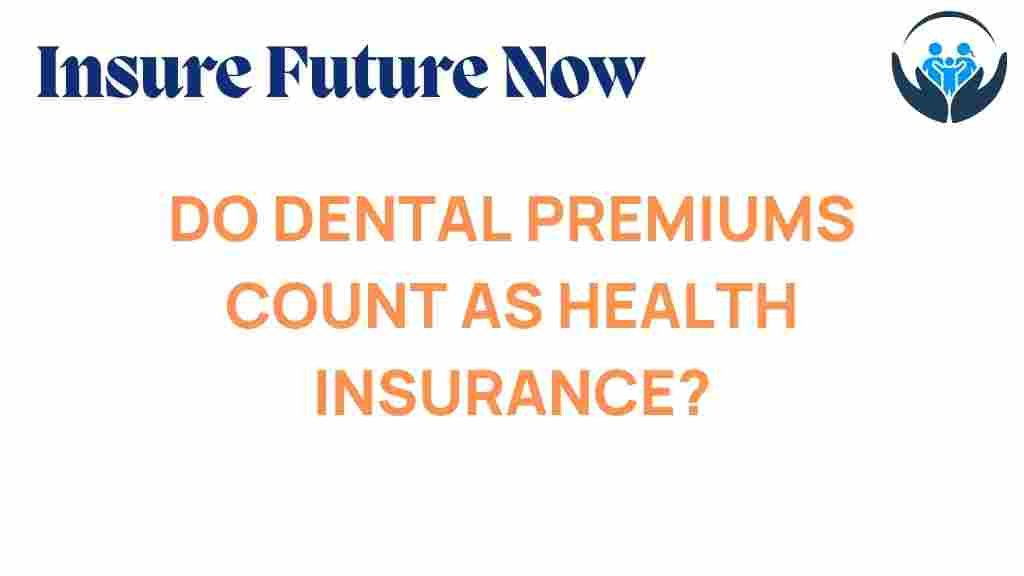Are Dental Premiums the Hidden Health Insurance Costs You Overlook?
When it comes to managing healthcare expenses, many individuals often focus on the obvious costs such as medical premiums, deductibles, and co-pays. However, one significant area that often gets overlooked is dental premiums. These premiums can add a considerable amount to your overall health insurance costs, and understanding them is crucial for effective financial planning.
In this article, we will explore what dental premiums are, how they fit into the broader scope of health insurance, and why they matter in your overall financial strategy. We will also provide tips on how to evaluate your dental coverage and ensure that you are making the most informed decisions regarding your healthcare expenses.
Understanding Dental Premiums
Dental premiums are fees paid for dental insurance coverage, which is often offered as a part of your health insurance policy or as a standalone policy. These premiums can vary widely based on several factors, including the type of coverage you choose, your location, and the specific insurance provider.
Types of Dental Insurance Policies
There are generally three main types of dental insurance policies:
- Preventive Plans: These plans typically cover basic dental care services such as routine check-ups, cleanings, and x-rays at little to no cost. They encourage preventive care to avoid more serious dental issues.
- Basic Plans: Basic plans usually cover preventive care and a portion of more extensive procedures like fillings, extractions, and root canals. However, they may have higher out-of-pocket costs compared to preventive plans.
- Comprehensive Plans: These plans often cover a wide range of services, including preventive, basic, and major dental work, such as crowns and bridges. While they offer the most extensive coverage, they also come with higher dental premiums.
Why Are Dental Premiums Important?
Dental premiums are vital for several reasons:
- Prevent High Costs: Dental procedures can be expensive. Having insurance helps mitigate these costs and makes dental care more accessible.
- Encourages Regular Visits: When you have coverage, you are more likely to visit the dentist regularly for preventive care, which can help catch issues early.
- Financial Planning: Including dental premiums in your budget is essential for comprehensive financial planning. Ignoring them can lead to unexpected expenses that may disrupt your financial stability.
Evaluating Your Dental Coverage
To ensure you are getting the most out of your dental premiums, it’s essential to evaluate your coverage regularly. Here are steps to take:
Step 1: Review Your Current Policy
Start by reviewing your current dental insurance policy. Look for:
- What types of services are covered?
- What are the out-of-pocket costs for those services?
- Is there a waiting period for certain procedures?
Step 2: Compare Different Plans
Don’t settle for the first policy you find. Compare different insurance types and their premiums. Use online resources or consult with an insurance agent to find the best options for your needs. Consider:
- Monthly premium costs
- Deductibles and co-pays
- Annual maximum benefits
Step 3: Consider Your Dental Care Needs
Think about your personal dental health. Do you have ongoing dental issues that require regular treatment? If so, a comprehensive plan might be more suitable despite higher premiums. On the other hand, if you only need preventive care, a basic plan might suffice.
Common Mistakes to Avoid
When it comes to dental premiums and health insurance, there are several common pitfalls to avoid:
1. Underestimating Costs
Many individuals fail to factor dental premiums into their overall healthcare expenses. This can lead to significant financial strain when unexpected dental issues arise.
2. Ignoring Preventive Care
Some people skip regular dental check-ups to save money. However, this can lead to more severe health issues down the line, resulting in higher costs overall.
3. Not Utilizing Benefits Fully
Many policies offer benefits that go unused. Familiarize yourself with what your plan covers and make sure to take advantage of all available services to maximize your investment in health insurance.
Tips for Effective Financial Planning
Incorporating your dental premiums into your broader financial planning is essential for managing healthcare expenses effectively. Here are some tips to help you:
- Budget Wisely: Include your dental premiums in your monthly budget. This will give you a clearer picture of your overall healthcare costs.
- Set Aside an Emergency Fund: Dental emergencies can happen. Having a financial cushion can help you cover unexpected expenses without stress.
- Stay Informed: Keep up with changes in your dental insurance policy and the dental care landscape. This knowledge can help you make better financial decisions.
Conclusion
In summary, dental premiums are a significant yet often overlooked component of health insurance costs. Understanding these premiums and how they impact your overall healthcare expenses is crucial for effective financial planning. By evaluating your coverage, avoiding common mistakes, and budgeting wisely, you can ensure that you are making the most of your dental insurance.
For more information on managing your healthcare expenses and exploring different insurance types, check out this helpful resource.
Remember, taking proactive steps in managing your dental care and associated costs can lead to better health outcomes and financial stability in the long run.
If you have any questions about dental premiums or need assistance with your health insurance policies, consider reaching out to a qualified insurance advisor.
Stay informed, stay healthy, and plan wisely!
This article is in the category Coverage and created by InsureFutureNow Team
